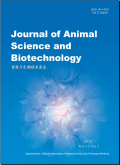首页|期刊导航|畜牧与生物技术杂志(英文版)|Could natural phytochemicals be used to reduce nitrogen excretion and excreta-derived N2O emissions from ruminants?
畜牧与生物技术杂志(英文版)2024,Vol.15Issue(2):490-508,19.DOI:10.1186/s40104-023-00942-0
Could natural phytochemicals be used to reduce nitrogen excretion and excreta-derived N2O emissions from ruminants?
Could natural phytochemicals be used to reduce nitrogen excretion and excreta-derived N2O emissions from ruminants?
摘要
关键词
Nitrogen metabolism/Nitrous oxide/Plant bioactive compounds/Ruminant/Urine patchesKey words
Nitrogen metabolism/Nitrous oxide/Plant bioactive compounds/Ruminant/Urine patches引用本文复制引用
Yuchao Zhao,Ming Liu,Linshu Jiang,Leluo Guan..Could natural phytochemicals be used to reduce nitrogen excretion and excreta-derived N2O emissions from ruminants?[J].畜牧与生物技术杂志(英文版),2024,15(2):490-508,19.基金项目
This study was supported by Beijing Captial Agribusiness & Food Group Co.,Ltd.'Integrated Innovation and Industrial Application of"Green Digital Intelligence"Technology in the Whole Dairy Industry Chain'(SNSPKJ2022)and National Natural Science Foundation of China(32302767). (SNSPKJ2022)

